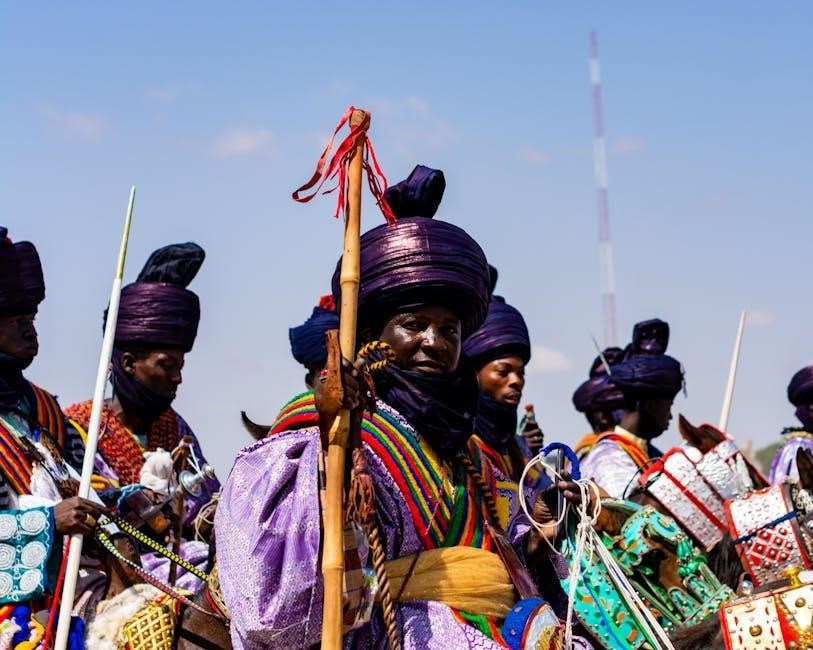Military coups have significantly shaped Nigeria’s political landscape, often resulting from internal grievances, political instability, and economic crises, as highlighted by Thompson’s thesis on military motivations.
1.1 Historical Context of Military Interventions
Nigeria’s history of military coups is deeply rooted in its colonial past and the political instability that followed independence in 1960. The legacy of British colonial rule left Nigeria with a fragmented political structure, which struggled to cohere into a unified nation. The first military coup in January 1966, led by Major Chukwuma Kaduna Nzeogwu, marked a turning point, overthrowing the civilian government amid widespread corruption and ethnic tensions. This event set a precedent for further interventions, as the military increasingly saw itself as the arbiter of national stability. The 1966 coups and their aftermath highlighted the volatile mix of ethnic rivalries, political mismanagement, and economic challenges that continue to shape Nigeria’s history.
1.2 Significance of Understanding Military Coups
Understanding military coups in Nigeria is crucial for analyzing the nation’s political trajectory and democratic development. These events reveal deep-seated issues such as governance failures, economic mismanagement, and ethnic tensions. By examining the causes and consequences of coups, policymakers can identify strategies to strengthen civilian institutions and prevent future interventions. Historical patterns show that coups often arise from military grievances, political instability, and societal pressures. This understanding is essential for fostering long-term stability and ensuring the consolidation of democracy in Nigeria.
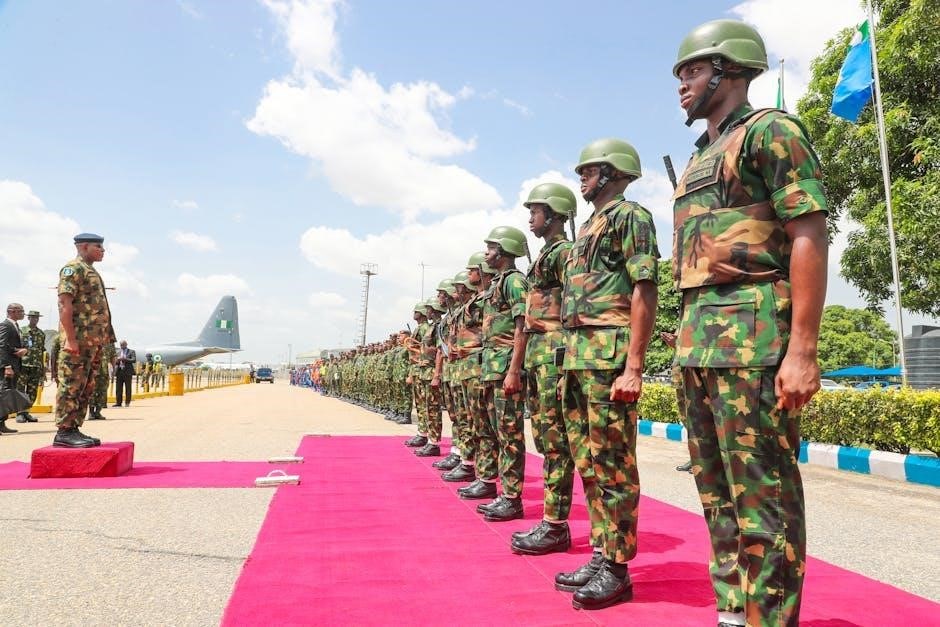
Historical Background of Military Coups in Nigeria
Nigeria’s history of military coups began post-independence in 1960, shaped by colonial structures and early political instability, leading to the first coup in 1966, which set a precedent and shaped its political trajectory.
2;1 Pre-Independence and Colonial Legacy
Nigeria’s pre-independence era was marked by British colonial rule, which laid the foundation for future political instability. The colonial administration established structures that favored centralized control, often disregarding ethnic and regional diversity. This legacy created tensions that persisted post-independence. The Nigerian military, initially shaped by British colonial influence, was structured to maintain order rather than serve democratic governance. The transition to independence in 1960 did not immediately dismantle these colonial frameworks, leading to a military institution closely tied to the state’s political affairs. The colonial period’s emphasis on hierarchy and control inadvertently influenced the military’s role in subsequent political interventions, setting the stage for Nigeria’s history of coups. This historical context underscores how colonial legacies shaped the military’s evolving relationship with governance.
2.2 Early Years of Independence (1960-1966)
Nigeria gained independence in 1960, marking a transition from colonial rule to self-governance. The initial years were characterized by optimism but also by deep-seated political and ethnic tensions. The country’s democratic framework was fragile, with weak civilian institutions struggling to manage regional and ethnic divisions. Political instability intensified as rivalries among the major ethnic groups—the Hausa-Fulani, Yoruba, and Igbo—escalated. These tensions were exacerbated by economic challenges and corruption, creating an environment conducive to military intervention. The legacy of colonial rule, which had centralized power and emphasized order over democratic governance, further influenced the military’s perception of its role in politics. By 1966, these factors culminated in the first military coup, signaling the end of Nigeria’s short-lived democratic experiment and the onset of prolonged military rule;
2.3 The First Military Coup of 1966
The first military coup in Nigeria occurred on January 15, 1966, led by a group of reform-minded officers, including Major Chukwuma Kaduna Nzeogwu. This coup marked a pivotal moment, overthrowing the civilian government amidst widespread political instability and ethnic tensions. The coup was motivated by grievances against corruption, regional favoritism, and the perceived inefficiency of the civilian regime. However, the coup’s execution was marred by ethnic bias, resulting in the deaths of prominent political and military leaders, predominantly from the Northern and Western regions. This event triggered a chain reaction, leading to a counter-coup in July 1966, which further polarized the nation along ethnic lines and set the stage for the Nigerian Civil War. The 1966 coups fundamentally altered Nigeria’s political trajectory, ushering in decades of military rule.
Causes of Military Coups in Nigeria
Military coups in Nigeria stem from internal grievances, political instability, economic crises, and ethnic tensions, as highlighted by Thompson’s thesis, which emphasizes military motivations and societal factors.
3.1 Military Grievances and Internal Conflicts
Military grievances and internal conflicts have been central to the occurrence of coups in Nigeria. These grievances often stem from ethnic divisions, resource competition, and perceived marginalization within the military hierarchy. The 1966 coup, for instance, was driven by frustrations among young officers who felt excluded from political decision-making. Internal conflicts, such as factional rivalries and communication breakdowns, further exacerbated tensions. Thompson’s thesis highlights how these grievances created a volatile environment, leading to military interventions. Such internal issues not only weakened civilian governance but also set the stage for repeated coups, undermining Nigeria’s political stability and democratic development. These factors remain critical in understanding the cyclical nature of military interventions in the country.
3.2 Political Instability and Weak Civilian Institutions
Nigeria’s history of military coups is deeply intertwined with political instability and the weakness of civilian institutions. The post-independence period saw a fragile democratic system plagued by corruption, ethnic tensions, and ineffective governance. Civilian leaders often failed to address widespread discontent, creating an environment where military intervention seemed justified. The 1966 coup, for instance, was precipitated by the perception of a corrupt and inept civilian government. Weak institutions, such as a divided political class and an underdeveloped legal framework, further exacerbated the situation. This power vacuum allowed the military to step in, capitalizing on the lack of strong democratic structures. Such instability not only enabled coups but also perpetuated a cycle of political fragility, undermining Nigeria’s long-term development.
3.3 Economic Crises and Mismanagement
Economic crises and mismanagement have consistently played a pivotal role in triggering military coups in Nigeria. Persistent issues such as poverty, unemployment, and inequality created widespread frustration among citizens. The misallocation of resources, coupled with rampant corruption, exacerbated these problems. For instance, the 1983 coup that brought General Muhammadu Buhari to power was largely a response to the economic turmoil and perceived mismanagement under the previous civilian government. The failure of economic policies and the inability to harness Nigeria’s vast resources effectively have often provided the military with a pretext to intervene. These economic challenges not only destabilized governance but also provided a justification for military leaders to seize power, promising reform and stability. This pattern underscores the deep interconnection between economic instability and political upheaval in Nigeria.
3.4 Ethnic and Regional Tensions
Ethnic and regional tensions have long been a significant factor in Nigeria’s susceptibility to military coups. The country’s diverse ethnic groups often clashed over resource distribution, political representation, and economic opportunities. These tensions were exacerbated by colonial legacies that emphasized regional divides. For instance, the 1966 coups were heavily influenced by regional rivalries, as northern and southern factions vied for control. The ensuing civil war (1967-1970) further deepened ethnic divisions, creating an environment of mistrust and instability. Military leaders frequently exploited these tensions to justify their interventions, framing coups as necessary to restore order or address perceived marginalization. This interplay of ethnicity and politics continues to undermine Nigeria’s democratic stability, making it a recurring theme in the nation’s history of military coups.
3.5 External Influences and Regional Coups
External influences and regional coup trends significantly impacted Nigeria’s political instability. The wave of military coups across Africa in the 1960s, particularly in neighboring countries like Upper Volta and the broader West African region, created an environment where Nigerian military officers were inspired to emulate such actions. The influence of global Cold War dynamics also played a role, as external powers sometimes supported coups to further their geopolitical interests. Additionally, Nigeria’s historical ties to Britain, especially its military structures, initially under British control, contributed to a legacy of military involvement in politics. These external factors, combined with regional instability, provided a catalyst for Nigeria’s own series of military interventions, shaping its coup-prone history.
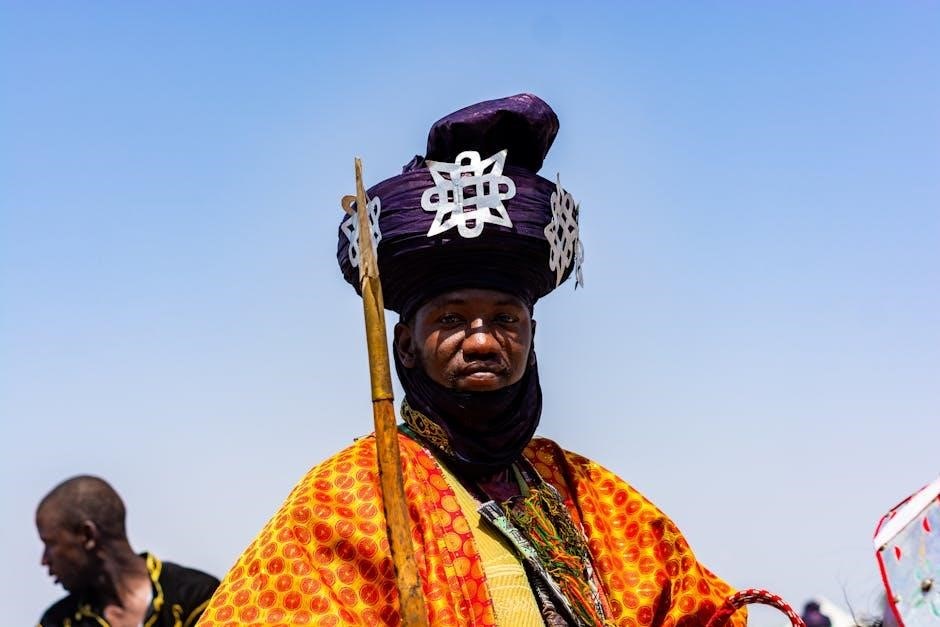
Key Military Coups in Nigeria’s History
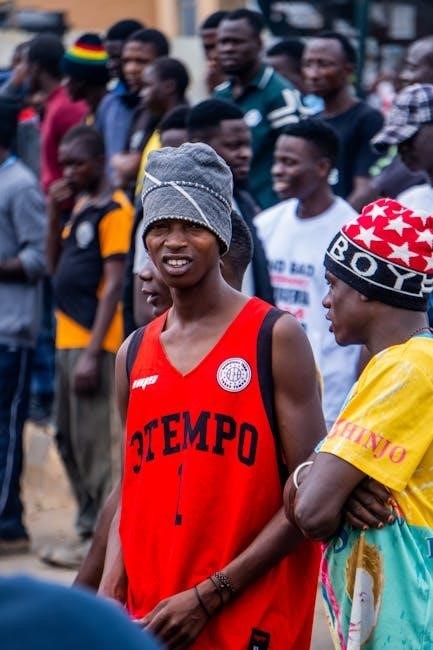
Nigeria experienced multiple significant coups, starting with the 1966 coups, followed by the 1975 overthrow of Gowon, and subsequent coups in 1983 and 1993, shaping its political trajectory.
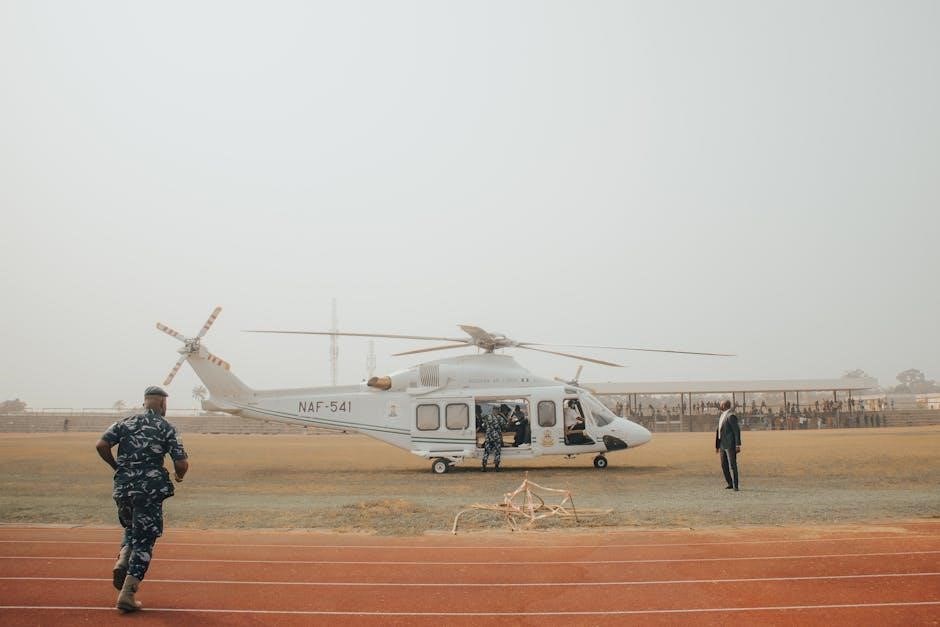
4.1 The 1966 Coups and Their Aftermath
The 1966 coups marked a pivotal turning point in Nigeria’s history. The first coup, led by Major Chukwuma Kaduna Nzeogwu on January 15, 1966, overthrew the civilian government, citing corruption and mismanagement. This coup, though unsuccessful in seizing total control, led to the installation of General Aguiyi-Ironsi as head of state. However, his leadership faced opposition, particularly from northern officers, who launched a counter-coup in July 1966. This second coup resulted in the death of Aguiyi-Ironsi and the rise of General Yakubu Gowon to power. The aftermath of these coups exacerbated ethnic tensions, leading to the Biafra civil war (1967-1970) and deepening political instability in Nigeria.
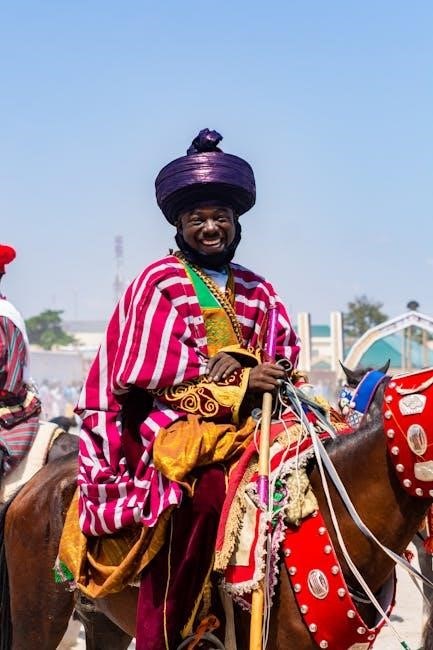
4.2 The 1975 Coup and Gowon’s Ouster
The 1975 coup led by General Murtala Mohammed ousted General Yakubu Gowon, who had ruled since 1966. Mohammed’s regime introduced reforms to address corruption and inefficiency. His leadership was popular but short-lived, as he was assassinated in 1976. The coup marked a shift in Nigeria’s political dynamics, emphasizing accountability and national development, though it also highlighted the military’s continued influence in governance.
4.3 The 1983 Coup and Buhari’s Regime
The 1983 coup led by Major General Muhammadu Buhari overthrew the civilian government of President Shehu Shagari amid widespread political instability and economic mismanagement. Buhari’s regime focused on anti-corruption measures, introducing the “War Against Indiscipline” campaign to restore public order and accountability. His government also emphasized economic self-reliance and debt management. However, the regime was criticized for its authoritarian style and human rights abuses. Buhari’s tenure ended abruptly in 1985 when General Ibrahim Babangida seized power in another military coup. This period marked a continuation of Nigeria’s cycle of military interventions, highlighting the challenges of transitioning to stable civilian rule and the enduring influence of the military in national politics.
4.4 The 1993 Coup and Abacha’s Rule
The 1993 coup brought General Sani Abacha to power, following the annulment of the June 12, 1993, presidential election won by Moshood Abiola. Abacha’s regime was marked by severe human rights abuses, political repression, and economic stagnation. His government cracked down on dissent, imprisoning opposition leaders and journalists. The regime also faced international sanctions due to its authoritarian practices. Despite initiating some economic reforms, Abacha’s rule is remembered for widespread corruption and the centralization of power. His sudden death in 1998 led to a transition to civilian rule under President Olusegun Obasanjo, marking the end of military governance in Nigeria after decades of intermittent control.
4.5 Other Notable Coups and Attempted Coups
Beyond the major coups, Nigeria experienced several other significant attempts and successful takeovers. The 1976 Dimka coup, led by Lt. Col. Buka Suka Dimka, aimed to overthrow General Murtala Muhammed but failed. Similarly, the 1990 Gideon Orkar coup attempted to topple General Ibrahim Babangida but was suppressed. These events highlight persistent military unrest. Additionally, the 1985 coup that brought General Ibrahim Babangida to power and the 1993 coup ending the Interim National Government are notable. These coups reflect ongoing instability and power struggles within Nigeria’s military and political elite, further destabilizing governance and democratic transitions. Each event underscores the complex interplay of internal and external factors driving military interventions in Nigeria’s history.
Effects of Military Coups on Nigerian Society
Military coups disrupted Nigeria’s governance, economy, and social sectors, exacerbating ethnic tensions and weakening institutions, which hindered long-term development and international relations.
5.1 Impact on Governance and Democracy
Military coups severely undermined Nigeria’s governance and democratic development. The frequent overthrow of civilian governments disrupted institutional stability, eroding public trust in democratic processes. Authoritarian rule replaced democratic frameworks, suppressing political participation and civil liberties. The coups perpetuated a cycle of political instability, hampering the consolidation of democracy. Civilian institutions were weakened, and the rule of law was often disregarded. The legacy of military rule continues to challenge Nigeria’s transition to sustainable democracy, as the nation struggles to establish strong, accountable governance structures. The repeated interference of the military in politics has left deep scars, complicating efforts to build a stable democratic future.
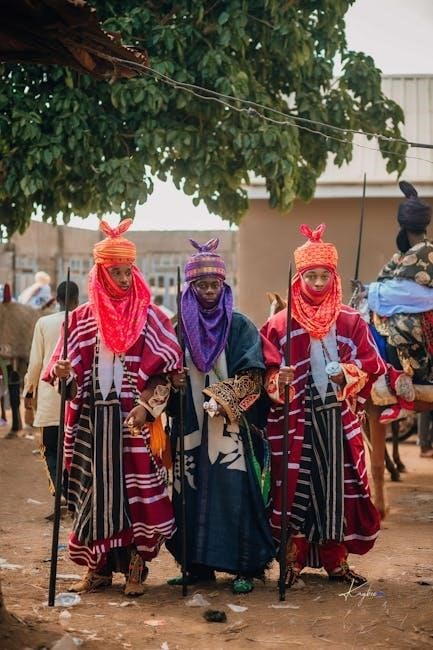
5.2 Economic Consequences and Development
Military coups in Nigeria have had devastating economic consequences, exacerbating instability and underdevelopment. The frequent regime changes disrupted long-term planning and policy continuity, leading to mismanagement of resources. Corruption and nepotism flourished under military rule, diverting public funds for personal gain. Infrastructure development stagnated, and critical sectors like education and healthcare were neglected. The economy became increasingly dependent on oil, making it vulnerable to global price fluctuations. Foreign investment declined due to political uncertainty, further hindering economic growth. Poverty levels surged, and social inequality widened. The cyclical nature of coups perpetuated economic crises, leaving Nigeria struggling to achieve sustainable development and structural transformation. The long-term effects of military rule continue to hamper Nigeria’s economic potential.
5.3 Educational and Social Sector Implications
Military coups in Nigeria have profoundly impacted the educational and social sectors, leading to significant setbacks. Education suffered greatly as military regimes often prioritized political stability over development, resulting in underfunding and neglect of schools. Universities and other institutions experienced frequent closures due to political unrest, hindering academic progress. Additionally, the quality of education declined as qualified professionals emigrated in search of stability. Social services like healthcare and welfare programs were similarly affected, with limited access for the majority of the population. The lack of investment in human capital has had long-term consequences, perpetuating poverty and limiting opportunities for future generations. These disruptions have hindered Nigeria’s ability to build a robust, educated workforce essential for national development. The effects of these policies remain evident today.
5.4 Foreign Policy and International Relations
Military coups in Nigeria have profoundly influenced the country’s foreign policy and international relations. The frequent regime changes created instability, leading to a loss of credibility on the global stage. International partners often viewed Nigerian governments with skepticism, particularly during periods of military rule. The coups also led to strained relations with Western nations, which often imposed sanctions in response to human rights abuses and undemocratic practices. However, Nigeria maintained strategic alignments with non-aligned nations and received support from countries like the Soviet Union during the Cold War. These shifts in alliances further complicated Nigeria’s position in global affairs. The legacy of military rule continues to impact Nigeria’s ability to foster consistent and trusting international partnerships.
5.5 Ethnic and Regional Disparities
Military coups in Nigeria exacerbated ethnic and regional tensions, often deepening divisions within the country. The 1966 coups, for instance, were partially motivated by ethnic and regional dissatisfaction, as different groups felt marginalized by the central government. The perception of unequal distribution of resources and power further fueled these disparities. The coups also led to violence and mistrust among ethnic groups, particularly during the 1967-1970 Biafra conflict. Military rule often favored certain regions, creating long-lasting resentment and political instability. These ethnic and regional disparities continue to influence Nigeria’s sociopolitical landscape, making unity and equitable development significant challenges. The legacy of military coups remains a barrier to bridging these divisions and achieving national cohesion.
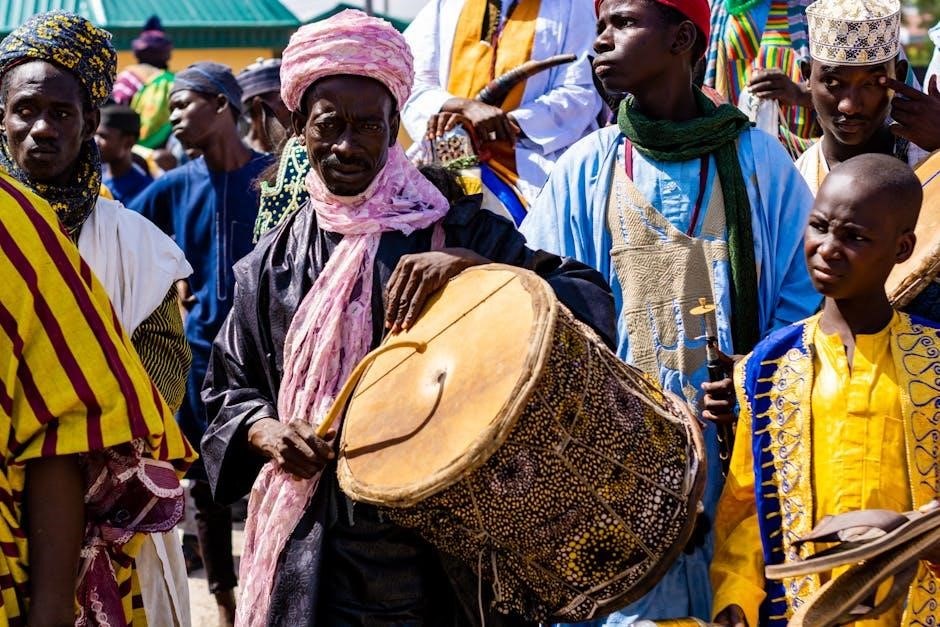
Consequences and Lessons Learned

Military coups in Nigeria led to prolonged political instability, undermining democratic governance and institutional strength. These events emphasized the need for robust civil institutions to prevent future interventions.
6.1 Long-Term Political Instability
The recurrent military coups in Nigeria created a cycle of political instability, eroding trust in democratic institutions and fostering an environment of constant power struggles. Frequent regime changes disrupted governance, leading to inconsistent policies and developmental setbacks. The coups exacerbated ethnic and regional tensions, as different groups competed for control, further fragmenting the nation. Economic mismanagement and corruption flourished under unstable regimes, weakening public confidence. Additionally, the coups hindered Nigeria’s international relations, as global partners grew wary of its unpredictable political landscape. Over time, this instability perpetuated a culture of mistrust and undermined efforts to establish a stable democratic framework. Long-term effects include weakened civil institutions and recurring threats of military intervention.
6.2 Military Reforms and Civil-Military Relations
The history of military coups in Nigeria necessitated significant reforms to improve civil-military relations and prevent future interventions. Post-coup regimes implemented measures to professionalize the military, emphasizing accountability and adherence to democratic principles. The establishment of institutions like the National Defence College aimed to foster strategic thinking and civilian oversight. However, challenges such as corruption and factionalism within the military persisted, undermining reforms. Civil-military relations remain strained, with incidents like the Odi and Zaki Biam massacres highlighting the need for greater accountability. Despite progress, the legacy of military rule continues to influence Nigeria’s political landscape, emphasizing the importance of sustained reform efforts to ensure civilian dominance and military subservience to democratic governance.
The Future of Civil-Military Relations in Nigeria
Nigeria’s future civil-military relations hinge on sustained reforms, democratic governance, and accountability. The military’s role in modern Nigeria must align with civilian oversight to prevent future coups and ensure stability.
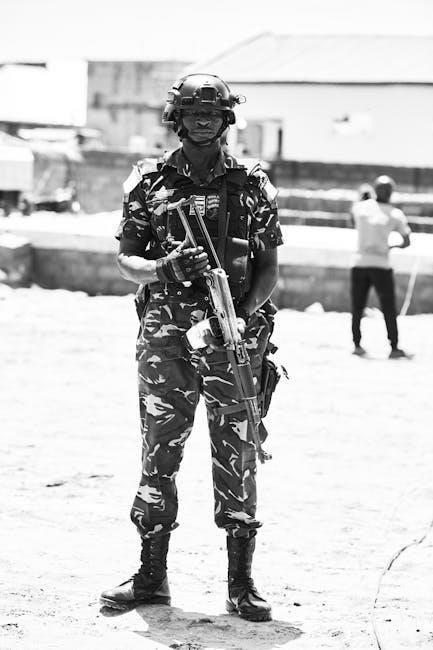
7.1 Prospects for Democratic Consolidation
Nigeria’s path to democratic consolidation requires strengthening institutions, ensuring accountability, and fostering trust between civilians and the military. Professionalizing the armed forces and aligning their role with democratic governance is crucial. Addressing societal divides and economic disparities can reduce coup risks. Public confidence in democratic processes must grow through free, fair elections and robust anti-corruption measures; International partnerships, like military cooperation with the UK, can enhance professionalism and accountability. Sustained reforms and inclusive policies are essential for long-term stability, ensuring the military remains a protector of democracy, not its adversary.
7.2 The Role of the Military in Modern Nigeria
The Nigerian military plays a critical role in maintaining national security and stability in modern times. Its primary responsibilities include defending the nation’s sovereignty, combating internal threats, and participating in international peacekeeping missions. The military has transitioned from a history of political intervention to a more professionalized force focused on protecting democratic governance. Internal security operations, such as countering insurgency groups like Boko Haram, remain a priority. Additionally, the military contributes to regional stability through ECOWAS missions. While challenges like civil-military relations and institutional reforms persist, the armed forces are increasingly aligning their role with democratic principles, ensuring their focus remains on safeguarding the nation and its people.
Military coups have profoundly shaped Nigeria’s political trajectory, with their roots in historical grievances, political instability, and socio-economic challenges. The recurring nature of these interventions underscores deep-seated issues within the nation’s governance and military institutions. While the military has transitioned to a more professional role in modern Nigeria, the legacy of coups continues to influence civil-military relations and democratic consolidation. Addressing the root causes of political instability and strengthening democratic institutions remain critical to preventing future interventions. By learning from past experiences, Nigeria can foster a stable political environment, ensuring the military’s role aligns with democratic principles and national development goals.
